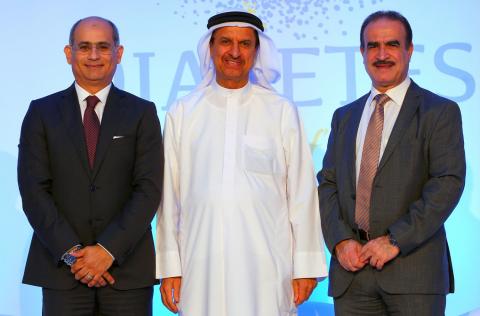
The UAE Ministry of Health and Prevention in partnership with the Emirates Diabetes Society, and within the framework of the new MoU signed by the Ministry with AstraZeneca Gulf, has launched Circle of Care, an education and support programme aimed to improve the well-being of people in the UAE living with or at risk of developing type 2 diabetes. The programme seeks to address the findings from a recent local diabetes report, undertaken by Project HOPE, a global health education and humanitarian assistance organization, beginning with a focus on Emirati diabetic patients.
The report was announced during a press conference held in Taj Hotel Burj Khalifa Boulevard in Dubai today, which was attended by His Excellency Dr Hussein Al Rand, Assistant Under-Secretary for Health Centers and Clinics at the UAE Ministry of Health and Prevention, Dr. Abdul Razzak Al Madani, President of Emirates Diabetes Society, and Samer Al Hallaq, Area Vice President for AstraZeneca Middle East. The conference was also attended by members of the National Diabetes Committee, a number of representatives from health institutes, diabetes experts, and prominent industry leaders.
Dr. Hussein Al Rand highlighted the importance of the new initiative, especially with its focus on chronic disease and impact on the society, something that ranks high on the Ministry’s national agenda. His Excellency praised the partnership between the Ministry of Health and Prevention, the Emirates Diabetes Society and AstraZeneca Gulf to form the Circle of Care, which was designed to address modern life challenges related to diabetes.
“The Circle of Care partnership reinforces the Ministry's goal to form strategic partnerships for community programmes, which supports the National Health Agenda to improve the curative and preventive services related to chronic diseases in the UAE, with the hope of decreasing the diabetes comparative prevalence in the country from 19.3 percent (IDF Diabetes Atlas, 6th Edition) in 2015 to 16.28 percent by 2021, (https://www.vision2021.ae/sites/default/files/healthcare.pdf) complementing UAE Vision 2021.” he said.
Circle of Care comprises of three pillars that focus on uplifting health care professionals’ medical capabilities, supporting initiatives set by local health authorities and medical societies’ regarding the importance of early diagnosis and diabetes control, and educating patients and caregivers. The initiative also includes providing new and culturally relevant diabetes resources and materials specifically developed for UAE residents, in line with the findings of the Project HOPE report, which focused on the main challenges that face diabetic patients. The final component is scientific research on diabetes, in which, the UAE will take part of.
Dr Abdul Razzak Al Madani, President of Emirates Diabetes Society, said the Circle of Care partnership seeks to improve diabetes knowledge, care and management among UAE citizens and residents.
“The first phase of the Circle of Care initiative focuses on Emirati diabetic patients with the aim to decrease adverse outcomes of diabetic patients during Ramadan and improve diabetes self-management through the creation of culturally competent education tools, increase access to prevention services, and train physicians to deliver culturally relevant education to local patients,” he said.
Among the resources introduced as part of the first phase of Circle of Care, was a special animated video, with a message for local diabetic patients during Ramadan set to be broadcasted online, in health care providers’ waiting rooms and through a local Emirati television network; a customized diabetes-friendly food menu, which adapts traditional Emirati cuisine for diabetics; locally relevant question and answer booklets tailored for both physicians and patients, with a focus on Ramadan fasting and diabetes self-management and; support materials for all health care providers and patients including posters for local diabetic patients with key tips to follow during Ramadan.
Samer Al Hallaq, Area Vice President for AstraZeneca Middle East, said the recent partnership with the Ministry of Health and Prevention and Emirates Diabetes Society was driven by AstraZeneca’s desire to improve the lives of people with diabetes in the UAE and was confident that Circle of Care programme would achieve just that.
“Through integrated educational and support activities and materials for both physicians and patients, and working to expand the capabilities of diabetes care teams including nurses, dietitians, pharmacists Circle of Care hopes to make a true impact on all people living with or at risk of diabetes,” he said.
The report identified some major gaps and challenges: a need for patients to receive support and education on managing their diabetes prior to and during Ramadan; a difficulty for patients in modifying their lifestyle and habits; patient challenges complying with physicians’ advice due to environmental and cultural barriers; a lack of culturally appropriate education tools on diabetes care. The report also offers recommendations on how to fill these gaps.
Categories
- Log in to post comments
